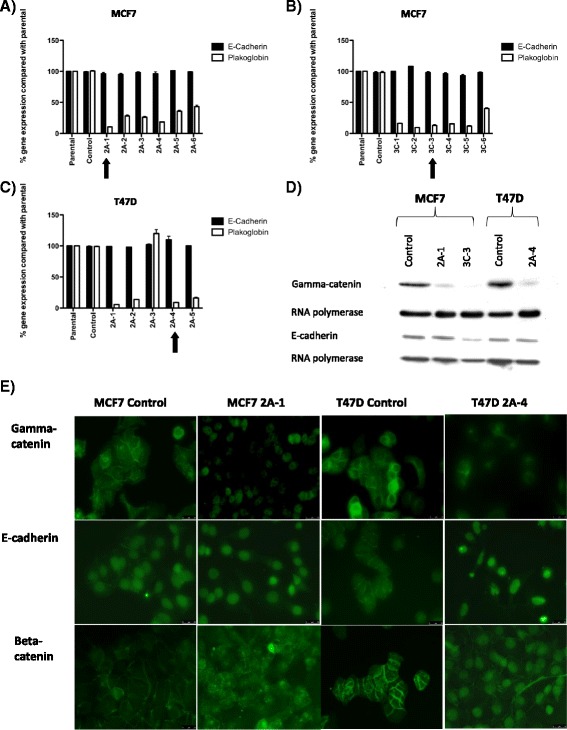Erratum
After the publication of this study [1] an error was detected in Fig. 2e. The same image was accidently used for beta-catenin staining of MCF7 2A-1 and T47D 2A-4. This error does not affect the findings or conclusions of the article. The corrected figure is shown below and we apologise for this mistake.
Fig. 2.

Shows relative expression of plakoglobin and e-cadherin compared with GAPDH ± SEM before and after siRNA knockdown with (a) scramble sequence or miRNA cassette 2 in MCF7 cells, (b) scramble sequence or miRNA cassette 3 in MCF7 cells, (c) scramble sequence or miRNA cassette 2 in T47D cells. d Are Western blots showing gamma catenin and E-cadherin expression following transfection with scramble sequence or miRNA cassettes 2 and 3. e Shows immunohistochemical staining for γ-catenin, e-cadherin and beta-catenin (green). In the control cells γ-catenin, e-cadherin and β-catenin are expressed on the cell surface clearly demarcating the cell-cell junctions. In the knock down lines, γ-catenin staining is reduced and e-cadherin and β-catenin is detected in the nucleus and the cytoplasm and β-catenin
Footnotes
The online version of the original article can be found under doi:10.1186/bcr3201.
Contributor Information
Ingunn Holen, Email: I.Holen@shef.ac.uk.
Jacob Whitworth, Email: mda07jw@shef.ac.uk.
Faith Nutter, Email: F.Nutter@shef.ac.uk.
Alyson Evans, Email: C.A.Evans@shef.ac.uk.
Hannah K. Brown, Email: mdp08hkb@shef.ac.uk
Diane V. Lefley, Email: D.V.Lefley@shef.ac.uk
Ivana Barbaric, Email: I.Barbaric@shef.ac.uk.
Mark Jones, Email: Mark.Jones@shef.ac.uk.
Penelope D. Ottewell, Phone: +44 (0) 114 271 1711, Email: P.D.Ottewell@shef.ac.uk
Reference
- 1.Holen I, Whitworth J, Nutter F, Evans A, Brown HK, Lefley DV, Barbaric I, Jones M, Ottewell PD. Loss of plakoglobin promotes decreased cell-cell contact, increased invasion and breast cancer cell dissemination in vivo. Breast Cancer Res. 2012;14(3):R86. doi: 10.1186/bcr3201. [DOI] [PMC free article] [PubMed] [Google Scholar]


